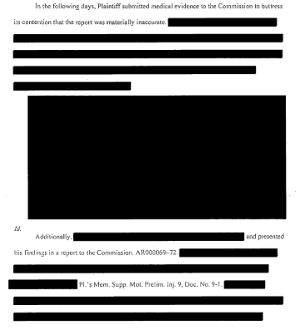Advocates Ask Court To Unmask Company Behind Anonymous Consumer Safety Lawsuit

Is this a barcode or a court doc?
After being shot down by the U.S. District Court in Maryland, the group — consisting of Public Citizen, the Consumer Federation of America, and our pals at Consumers Union — have taken their case to the 4th U.S. Circuit Court of Appeals.
(SEE THE PDF OF THE FULL APPEAL HERE)
The lawsuit itself involves a mystery business, “Company Doe,” which had issues with a consumer safety complaint submitted to the CPSC’s Congressionally mandated SaferProducts.gov database.
The database allows consumers and other sources to file reports of possible safety-related issues about consumer products. Much like the long-running auto-related database operated by the National Highway Traffic Safety Administration, manufacturers are then given the chance to respond and possibly dispute the claims.
Company Doe initially claimed that the complaint — itself redacted in its entirety in the court docs — contained materially inaccurate information. There were then two more rounds of back-and-forth between the company and the CPSC, which ultimately redacted the disputed info in the complaint. That apparently wasn’t enough, because Company Doe subsequently filed suit against the CPSC and its chair, Inez Tenenbaum.
The advocacy groups believe this is the first time a court has ever sealed a court record and allowed a plaintiff company to proceed under a fictitious name, all over concern for a company’s reputation.
“The public has a First Amendment right of access to court proceedings,” said Scott Michelman, the Public Citizen attorney handling the case. “The denial of public access is particularly problematic where the case involves a matter of public safety and a challenge to the implementation of a new statute. Adjudicating cases based on secret proceedings, with secret facts and a secret plaintiff, is incompatible with our tradition of open government.”
The District Court ruling sealed all key facts from public view, preventing the public at large from seeing the company’s name and relevant court findings, like the identity of experts who provided testimony in the case or what that testimony may have been about.
Reads the appeal filed today:
This case… proceeded from filing to judgment with a secret plaintiff, secret arguments, and secret facts. At the same time it granted summary judgment for the plaintiff, the court ruled that crucial facts about the case, including the plaintiff’s identity and the court’s fact-based reasons for granting judgment to the plaintiff, will remain permanently sealed. The seal imposed in this case is incompatible with our law and national tradition of public access to court proceedings.
“The database is a vital consumer safety tool that helps ensure shoppers are properly informed about hazards lurking in the marketplace,” said Ami Gadhia, senior policy counsel for Consumers Union. “We use the database regularly as a resource to help us keep our readers informed.”
Added Rachel Weintraub, legislative director and senior counsel for Consumer Federation of America, “Congress required the CPSC to establish this database in order to reduce delay in informing the public about unsafe products. But if the sealing that occurred in this case is permitted, many companies will seek to challenge database entries in secret, and the entries could be hidden from the public for what could be years. The result will be exactly the type of delay Congress sought to prevent.”
Want more consumer news? Visit our parent organization, Consumer Reports, for the latest on scams, recalls, and other consumer issues.

